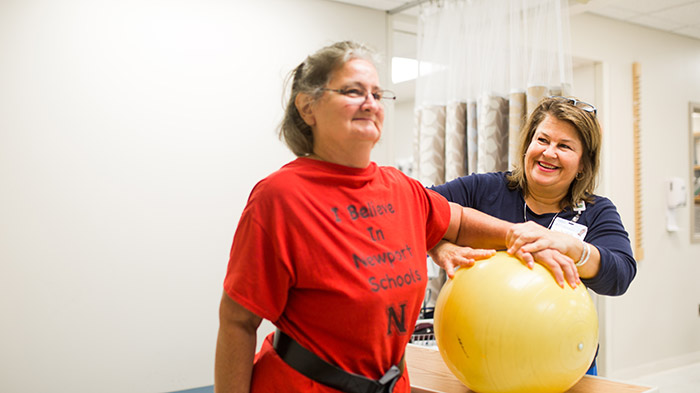Occupational therapy is a critical aspect of caring for patients with neurologic disorders such as Parkinson’s disease and recovery from a stroke. As we recognize National Occupational Therapy Month in April, we also celebrate the role occupational therapists play in helping people with neurologic disorders live life to the fullest.
Annette Erickson, OT/L, CLT, LSVT, an Occupational Therapist at St. Elizabeth Healthcare with specialized training in treating patients with Parkinson’s disease and lymphedema therapy, explains the role she plays in her patient’s lives.
“Occupational therapy helps care for the whole person, not just their medical condition. We look at how their health affects their body, mind and everyday life,” she says.
Annette is also certified in the Lee Silverman Voice Treatment (LSVT) BIG. This specialized treatment program helps patients with neurological disorders such as Parkinson’s reacclimate to performing everyday tasks. Neurology patients typically experience movement changes, and their motor skills become slower and lessen in range over time. Often, this includes difficulty with fine motor skills, such as buttoning a shirt, or large motor skills, such as rising from a sofa. LSVT BIG exercises can improve your ability to complete these tasks. The treatment program is different for everyone, as the LVST BIG treatment is designed for each patient’s specific needs and goals. Overall, the program improves balance and the ability to complete self-care tasks.
What is Occupational Therapy?
Occupational therapy focuses on helping you develop the necessary skills for your everyday life.
Erickson says, “It is important for me to do a full assessment and determine how the disease affects you as an employee, spouse or friend. How is it limiting your work, hobbies and social life?”
During an assessment, an occupational therapist determines how the disease limits normal functioning and evaluates the treatment goals. Every patient has different goals, from driving to going to the bathroom by yourself or holding your grandchild. After they establish your goals, the occupational therapist works with you to create a plan to reach them, including:
- Cognitive skills to help complete tasks and solve problems.
- Exercises or stretches to gain strength.
- Making the environment around you safe.
- Modifications to daily living activities.
- Recommending physical aides or durable medical equipment.
“We use a variety of tools and therapies to help people achieve their goals,” says Erickson. “We also create a plan that provides encouragement and celebrates as they achieve milestones. We also help patients through their entire health journey, not just at diagnosis. With any neurologic disorder recovery changes — you get stronger or have plateaus — we help you every step of the way.”
Outpatient Neurology Interventions and Stroke Therapy Program
Patients with neurologic disorders receive specialized one-on-one care at the Outpatient Neurology Interventions and Stroke Therapy program. Through a coordinated visit, you will see a variety of therapists participating in your recovery — occupational, physical and speech therapists.
Erickson says, “We recognize that each patient has unique situations that can make getting to therapy difficult, so we do our best to coordinate therapies each visit for the convenience of the patient.”
As an occupational therapist, Erickson appreciates the special relationship she builds with the people in her care. “It makes your heart sing when someone reaches a place of accomplishment — they are doing something that makes them happy. Recovery can be a long road, so we get to know our patients. We understand what makes them tick and recognize if they are having a bad day.”
Erickson became an occupational therapist so she could facilitate change in the lives of others. “Making someone’s life better is an amazing gift,” she says. “Occupational therapy allows me to have a lasting impact on the lives of others.”
Learn more about our occupational therapy team online or call 877-424-5750 to make an appointment.

